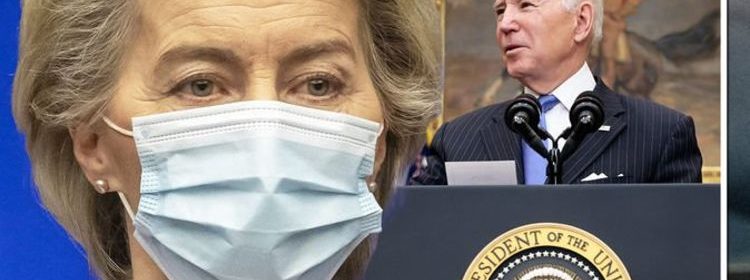VDL sent urgent warning over ‘stunning democratic breakdown’ after brutal Joe Biden snub

Biden’s measures against China ‘half baked’ says Benton
We use your sign-up to provide content in ways you’ve consented to and to improve our understanding of you. This may include adverts from us and 3rd parties based on our understanding. You can unsubscribe at any time. More info
US President Joe Biden will gather 111 world leaders in a virtual meeting dubbed the Summit for Democracy, in what Washington hopes will be a boost for global democracy threatened by an increase in authoritarian rulers.
US officials promise a year of action will follow the two-day conference but preparations have been overshadowed by questions over some invitees’ democratic credentials, and complaints from uninvited countries.
The US leader has chosen not to invite Hungarian Prime Minister Viktor Orban sparking a diplomatic row in the EU.
The Hungarian leader has vetoed the entire bloc’s participation in the summit in response.
The move by the US President was driven by a report by NGO Freedom House which established that Hungary is no longer a democracy and Poland is not far from following the same path.

In the report, which included 29 countries from Central Europe to Central Asia, the authors noted “a stunning democratic breakdown” and warned “fewer democracies in the region today than at any point since the annual report was launched in 1995″.
They put the blame on the EU Commission’s ineffective measures against Hungary and Poland.
They wrote: “Neither Poland nor Hungary has faced repercussions for damaging the rule of law at home, and Hungary’s ruling Fidesz party has even remained a member of the mainstream European People’s Party, the largest grouping in the European Parliament.”
Hungary adopted an emergency law that allows the government to rule by decree indefinitely, which according to the report “has further exposed the undemocratic character of Orban’s regime”, adding that “Hungary’s decline has been the most precipitous [they have] ever tracked.”
The report was published last year. At the time, Zoltán Kovacs, Hungary’s secretary of state for international communication and relations, said on Twitter that Freedom House “was once known as the bipartisan human rights organisation. With their [George] Soros funding they’ve declined, becoming the fist of the party that is the Soros network. Anyone who doesn’t conform to their liberal view, gets downgraded.”
The US State Department’s top official for civilian security, democracy, and human rights Uzra Zeya said today’s event would bring together both established and emerging democracies and help them deliver for their people at “a moment of democratic reckoning.”
The conference is a test of Biden’s assertion, announced in his first foreign policy address in February, that he would return the United States to global leadership to face down authoritarian forces led by China and Russia.
Both countries were not invited to this week’s event, which coincides with questions about the strength of America’s democracy. Biden is struggling to pass his agenda through a polarised Congress and after former President Donald Trump disputed the 2020 election result, leading to an assault on the US Capitol, the legislative seat, by his supporters on January 6.
DON’T MISS:
Joe Biden mocked by Vine for Vladmir Putin call blunder [VIDEO]
EU gaping funding loophole as bloc ‘not transparent’ [ANALYSIS]
US-UK trade talks erupt as AMT threatens to impose tariffs on goods [INSIGHT]

An invitation list published last month included countries whose leaders are accused by human rights groups of harbouring authoritarian tendencies, like the Philippines, Poland and Brazil.
It also included Taiwan, stoking anger from China, which considers the democratically governed island part of its territory.
A Chinese foreign ministry spokesperson said the invitation of Taiwan showed the United States was only using democracy as “cover and a tool for it to advance its geopolitical objectives, oppress other countries, divide the world and serve its own interests.”
Washington has used the run-up to the summit to announce sanctions against officials in Iran, Syria and Uganda it accuses of oppressing their populations, and against people it accused of being tied to corruption and criminal gangs in Kosovo and Central America.
US officials hope to win support during the meetings for global initiatives such as use of technology to enhance privacy or circumvent censorship and for countries to make specific public commitments to improve their democracies before an in-person summit planned for late 2022.
Annie Boyajian, director of advocacy at non-profit Freedom House, said the event had the potential to push struggling democracies to do better and to spur coordination between democratic governments.
She said: “But, a full assessment won’t be possible until we know what commitments there are and how they are implemented in the year ahead.”
Zeya at the State Department said civil society would help hold the countries, including the United States, accountable.
Zeya declined to say whether Washington would disinvite leaders who do not fulfill their pledges.
Source: Read Full Article
